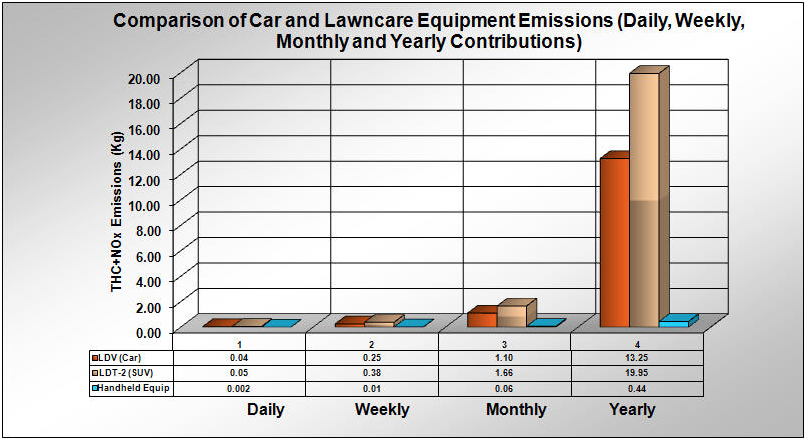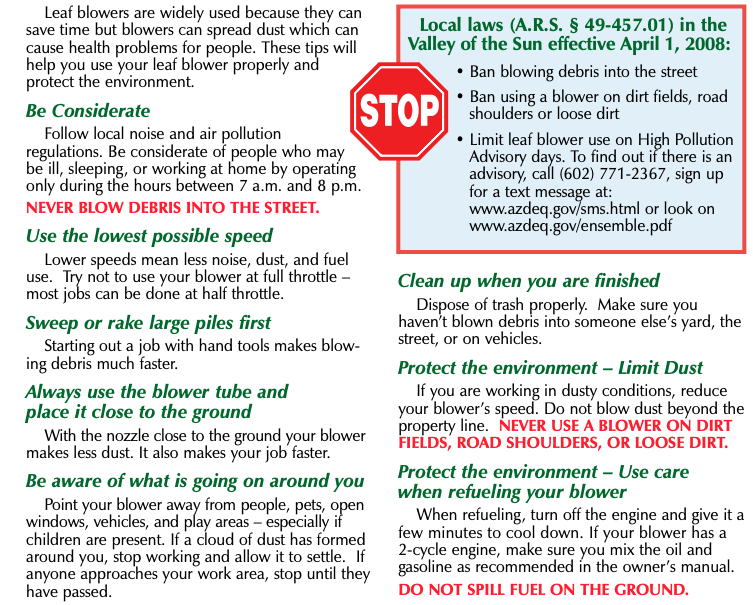As anyone in the landscape industry would be aware the back pack blower is now ubiquitous as a piece of equipment and pretty much all self respecting landscape maintenance contractors will own at least one and possibly a full fleet of various blowers for leaf and debris control.
Being a landscaper, the sound of duelling blowers is something you get used to. It doesn’t mean you like it, but you do realise it is the sound associated with getting work done and possibly meaning that that particular clean up project is almost finished.
To a member of the general public the back-pack blower is nothing less than a menace. Share on XNoisy, dust raising and polluting. A constant interference in their daily routine. Less tolerable* than a lawn mower, hedge trimmer or weed-whacker.
(*in truth, I believe the ‘tone’ of the back-pack blower engine is the issue rather than the volume – I am developing some results on this at the moment).
The town meeting was a positive discussion, both sides recognising that the back-pack blower is an important piece of equipment in allowing home owners to have their property looking the way they want it without the expense of laborious sweeping or hoards of manpower to rake up leaves and debris.
However the noise!
What can we do about it?
The largest complaint appeared to be marauding, guerrilla type landscapers who blitz a neighborhood with trucks emptying of crews mounted with backpack blowers who start blowing debris from property to property and public street. Regardless of time of day or indeed working day restrictions these crews ignore the wanton pleas from neighbors begging for peace and quiet over breakfast or evening meals.
To generate a solution we need to identify the main problems and the key points of argument:
Noise!!
Yes backpack blowers are loud. How loud is a matter of circumstance. How close are you to the source? Are you the operator or observer.
With noise, OSHA's permissible exposure limit (PEL) is 90 dBA for all workers for an 8 hour day. Share on XFor most operators the solution is linear. Like all Safety Matters the goal is to minimise the risk of exposure which causes damage over time. Looking at the hierarchy of control and applying it to petrol backpack blowers for operators:
- Elimination – operators can not eliminate the noise of a backpack blower. It is a fact of life when it comes to operating these machines – the internal combustion engine makes noise.
- Substitution – this is where the option of battery powered machines may come into the picture as a possible option.
- Engineer – noise reducing exhaust, limited power ratings, machine built to place engine and exhaust as far from operator as possible. This step has probably reached the pinnacle of design limits.
- Administrative – this is governance; limiting time of exposure, training people in efficient operation (no need for 100% throttle 100% of the time) using as a last resort (rakes, brooms etc first)
- PPE – when all else fails you use PPE to mitigate the risk of hearing and vibration damage. Noise reducing ear muffs, goggles, gloves and a dust mask (if warranted)
For observers it is entirely different – you can’t hand out ear muffs to every passer by!
However you will find that while it is excruciatingly annoying for most observers, unless you are right on top of the blower & operator the noise levels will (generally) be within the ‘safe’ zone of <90dBl.
This does not eliminate the nuisance factor though which is more likely caused by landscape crews working an area. This means residents at home during the day may get no break from the sound reverberating around their community all day long.
The ability of this sound - in particular its lower frequency components - to travel over long distances suggests that GLB sound has a wide ranging impact on surrounding communities... Share on XSource – https://sciforschenonline.org/journals/environmental-toxicological-studies/JETS-1-106.php
Dust…
It is inevitable when using a blower that you are going to raise dust and debris into the air. Its inevitable using a brush too and a research paper in
Aside from the nuisance mentioned above, there are respiratory issues for operators and observers around the issue of air borne particles. A research paper found that in terms of Particulate Matter contribution backpack blowers generate 100 times less airborne debris than vehicles driving.
Also interesting is:
The broom operator was able to move the surrogate material along the concrete surface quite rapidly with the broom; resulting in emissions similar to those obtained with power leaf blowers.
Similar to above the solution here is operator training – lowest blower speed possible to move debris, gather in piles and avoid blasting big heaps of debris, limit blower use to cleaning lawns and borders as much as possible.
Engine Emissions & Pollution
This is a common argument however in modern equipment it really doesn’t stand up to scrutiny as the EPA has mandated that all small engines must confirm to strict exhaust emission requirements.
We can refute this argument quite easily with facts where you will see in general the contribution factor of petrol powered equipment is minuscule when compared to vehicles.

Possible Solutions & Best Practise
The number one alternative (brushing and wide-scale raking is not a practical alternative for commercial operations) to petrol powered blowers is battery power.
My personal issue with this is of the 3 key arguments only one point is addressed in a mildly satisfactory way while a second is neutral and the third is totally unsatisfactory.
Battery Powered Noise
Changing from petrol to electric or battery simply changes from one type of noise to another.
Battery and electric motors produce noise at a similar dB level as petrol!! The key difference which people tend to miss is the sound is a different frequency. Think of vacuum cleaner whine or similar from a cordless drill.
Battery Powered Dust
Dust is dust, same old issue here if you have equivalence in power or airforce rating between the two blowers.
Battery Powered Emissions
This is the biggest issue.
Bear in mind the carbon, greenhouse gas generating, polluting contributions of the production of electricity to charge your batteries in the first place before you use this argument.
Renewable energy production from wind or wave is still a long way off. Unless you have already invested in windgenerators or solar banks you will be reliant on the national grid to charge your multiple batteries.
Not to mention the ecological damage caused by mining for battery minerals…
Best Practise
If you are not ready to consider battery power or alternative methods then you should at least train your operatives to be considerate and courteous. There is no need to be blasting a blower for hours as a chain gang (autumn/fall aside). Use it briefly for final clean up after maintenance operations or end of day neatness.

Consider pedestrians, cyclists and drivers if using near a road. Dust, dirt and particles are a nuisance – would you like an unexpected blast of grit to your face or paintwork? Drop the power and turn your back for a few seconds, let people pass.
Throttle up and down reacting to the debris you are dealing with. There is no benefit to you and its definitely not quicker to run 100% throttle and push a pile of dirt in front of you. Make a small pile with the blower, pick it up with a shovel and use the blower to gather the residual into the next pile.
https://legacy.azdeq.gov/environ/air/download/Leaf_Blower_Training.pdf
Conclusion
Petrol backpack blowers whether you consider them a pest or not will be a part of our daily lives for a while to come.
Personally I think the next 10 years may see the costs of battery power balance out where power rating compares and renewable energy makes the choice a more environmentally sound one.
As for banning. It’s not really the landscapers fault when people employ them to do a job and then ask to remove their tools.
Are you ready to pay the additional cost for manual labor clearing leaves or sweeping your yard?
